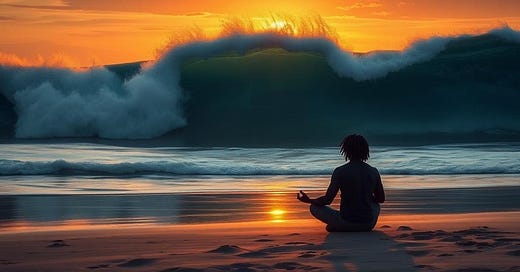From Invisible to Unshakable: How to Stop Feeling Like You Don’t Matter
How a seemingly simple shift unlocked something vital in me.
Welcome to Writing Under the Palm Tree. This week, we’re discussing the posture needed to challenge negative thoughts as they wash over us.
I felt it again.
The morning hour is dim. Sunlight peeks over the reeds of the marsh beyond my bedroom window.
I feel that bottomless, forever dropping feeling of “you ain’t shit,” “you’re here to fulfill your roles—no one gives a shit about you otherwise.” It always blooms somewhere in my lower abdomen whenever I wake up. The feeling is violent but steady, a resolute grip around my throat. The pre-dawn silence can do little to muffle the expanding pressure of that corkscrew of a sensation.
I think of disappearing, not dying, just no longer being. The feeling comes to the fore on its own.
The thought, like the feeling, feels separate from my body. It is as if both the idea and the feeling are scabbed hands reaching out with emaciated fingers to constrict my heart.
Thoughts and feelings are not slowed by logic. They are not derailed by outside evidence. Evidence of my intrinsic value to others. My wife tells me often how attractive she finds me, and the words slide off me, mushy, already dissolved before they hit the ground.
I am the one always cracking up colleagues, friends, and acquaintances. I try to leave a smile on everyone’s face before I leave any given room. Yet, I feel hollow, as if filled with nothing but swirling irrelevance.
In my early thirties, around the birth of my first son, something began to shift.
This is my attempt to document what that was and how this shift in my emotional landscape has impacted my creative life.
The shift: never all at once, but right on time
Since my earliest memory, I have been the other.
My mother won a Visa lottery when I was six years old, and my sister was four. It felt like a Willy Wonka fantasy come to life. We would be able to join my father, who was a Visiting Professor of Anthropology at Washington University of St. Louis. It felt like we had won the golden ticket.
The ticket felt less golden when I arrived in America, opened my mouth, and was hazed by my classmates and sidelined for saying “boot” when I meant “trunk,” and “rubbish” when I meant “trash.”
It’s possible that even back then, my brain was being re-wired. I was being taught who was worthy of meaningful social connection and who was worthy of scorn, who was worthy as entertainment, as something curious to play with before moving on to something more relevant.
Then, there was my accent. To my mostly white classmates, I was the definition of alien. I was the definition of a resident “alien,” just like it said on my then—green card. To these children of liberal academics, my accent was not fully British, nor was it American enough or African enough.
During Elementary and middle school, loneliness was my closest friend—well, loneliness and two other outcasts: Pavel, who had just arrived from Eastern Europe, and Devin, an unapologetic Dungeons and Dragons fan and Nintendo enthusiast. Everyone else used me to cosplay what it would be like to have a Black friend, and they were gone when the novelty wore off.
All of this is to say that marginalization was the air I breathed in Southern New Hampshire. Me, with my dark skin, and kinky hair, chubby cheeks, and imperfect hairline.
I breathed in deep because I needed air, and I was suffocating. I still was, until I finished grad school, moved to Boston, and became an Educator of Black and Brown kids. I wanted them to help live expressive, full, beautiful lives.
The shift began when I had my first son, Ayotunde. I began thinking more and more of my boyhood. I thought of all the small things, all the big things I never felt I was entitled to, body-illuminating joy, small kindnesses, people choosing to be near me, love, laughter, ambition, a hope that soars.
If I don’t think I’m worthy of any of these things, how would I ever convince ayo (the first) that he was and will always be worthy of all of this and more?
I needed to locate the lynchpin. The one that would unlock all these chains that had been wrapped around my ribcage, year over year.
I had to ask myself, what short-circuited everything? What surged me back into my body, rooted me back into the earth, tied me taut and secure to others? What was the thing I had been violently told was never to be mine?
The answer that kept flicking across the curves of my brain was pleasure. Self-pleasure, shared pleasure. Not just the carnal kind, although that was part of it, but the kind from sharing a good story, a good joke, a profound realization, the kind that comes from pursuing your desires, your goals, running towards them, chasing them deeper and deeper still to wherever they lead.
Challenging societies lies at their root
I am angry. I can not lie about that.
At times, I still feel like that chubby pre-teen who has been stuffed into a box, who has been told what he can be. He would be lucky if anyone outside his immediate family ever loved him, ever saw him as being worth investing in.
The anger is there. It simmers.
It comes out raw, tangled, whirling when I’m running, lifting, writing, watching something emotionally triggering. It’s a shadow that lies a millimeter beneath my skin.
My meditative practice. The search for silence and non-judgemental reflection, where the dark thoughts and ideas crash, ebb, flow, recede.
I am on the shores of my subconscious; those negative thoughts try and move me but only succeed in washing over before drawing back any remaining residue evaporates in the sunlight lathering my skin.
Where does the challenge come in? In the moment when I see the wave, the moment it begins to crest, and I register the looming swell for what it is. An assumption, a summation from those who never knew me, never were interested in knowing me.
It is in that expanse of time before the attempt to overwhelm me in irrelevance that I can widen my stance, mentally dig my feet into granules of sand, and close my eyes. These thoughts are not part of me, they are what they have always felt like at their core—apart from me.
I now challenge these thoughts by refusing to yield ground. By staying rooted in who I am, what I know, what I love, and how I show up for those who rely on me, how I show up for myself.
In Africa, my ancestors have a saying.
When the roots are deep, there is no reason to fear the wind.
Another, saying—which very much not from Africa it’s more of Herbert-ian saying (think: Dune series), but one I also live by is this, “I must not fear. Fear is the mind killer.”
Challenging fear, fear of rejection, fear of loneliness, fear of irrelevance, fear of talking to and meeting new people, fear of exclusion, starts in the mind, with a shifting of posture, a digging in of feet, a spreading of toes. It starts with a promise to yourself to let the fear move through you and around you, the way wind moves through and around a deeply rooted palm tree, ruffling its fronds but never unrooting it.
I fear loneliness. I fear it deeply. It is probably a core fear.
I am becoming a deeply rooted tree by staying in place and opening myself up to the possibilities that arise in loneliness. The possibility of seeing myself more clearly, not as a being in relation or in contrast to other beings, but as a singular person of singular inherent value.
To that end, I am returning to a country I lived in for six months: Spain, Barcelona, more specifically. I will be there for a week, revisiting myself as myself. I plan to meditate, write, run, eat, and sleep. Just be.
May you find time and space to root yourself in who you are, your intrinsic value, the spark you know as your unique personality, and your unique interests. And as a deeply rooted person, may you never have reason to fear the wind. May it feel like a breeze of lies that ruffle but never displace you. May you no longer claim society’s lies about who you are and what you are worthy of.
What are one or two things you do to stay deeply rooted in whats true about you in these chaotic times?
Share your thoughts below. Not everything works for everyone, but what you say may be the lifeline a fellow creative needs to hold their ground.
Let’s create a collective space for resilience.
In Solidarity,
Olu











Thank you for sharing this, Olu. I almost feel as if I have had that moment on the beach just now through your telling it, toes in sand, facing the immense sea and feeling a part of it all. I wish this capacity for anyone who has felt scared or small, constricted, coerced. To be at one with the natural world, whether it be found at beach or suburb, city or farm, is a protection for our souls against the ravages of all sorts of harms that humankind can inflict. I sometimes feel I have lived this way, a little bit outside of the world around me, and watched the world hustle and bustle and seemingly wish to tear itself apart. Yet each one of us contains the universe. How can any be Other. There is a world where we don't tear ourselves, others and the world apart. I hope we will all try to imagine it and move in that direction.